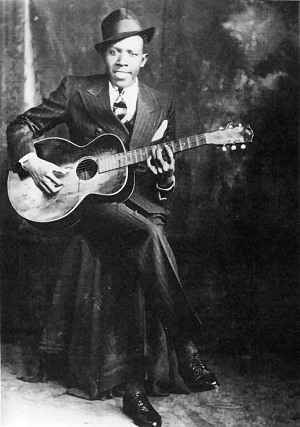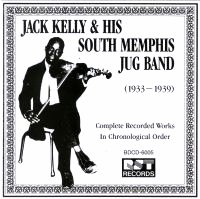
Set Four: The "Lost" Volume; Disc One; Track Twelve: "Last Fair Deal Gone Down" performed by Robert Johnson. Recorded in San Antonio, Texas on November 27, 1936. Original issue Vocalion 03445.
Robert Johnson was born Robert Dodds in Hazelhurst, Mississippi on May 8, 1911 or 1912. He was born to Julia Major Dodds, who was married at the time to Charles Dodds, although Dodds is not believed to be Johnson's father. Robert's father was a plantation worker named Noah Johnson.
When Robert was two years old, a dispute with white land-owners forced Dodds to flee Hazelhurst. Julia fled separately with Robert, eventually sending young Robert to live with Dodds, who was now living in Memphis under the name "Charles Spencer." Renamed Robert Spencer, Johnson lived with Dodds for two years before rejoining his mother near Tunica, Mississippi. By this point, Julia was remarried to a much younger man named Dusty Willis. For much of his childhood, Johnson was known as "Little Robert Dusty." After being Robert Dodds, Robert Spencer, and Robert Dusty, Robert finally adopted his natural father's surname and was signing his name "Robert Johnson" when he married sixteen-year-old Virginia Travis in 1929. Robert was widowed shortly after his marriage when Virgina died in childbirth.
It was around this time, while living in Robinsonville, Mississippi, that Johnson met Son House and Willie Brown. According to House, Johnson was playing guitar, but was not very good. He would occasionally attempt to sit in with House and Brown, who would ridicule Johnson's faltering attempts at the guitar. Discouraged, Johnson left Robinsonville.
What happened next is entirely conjecture. House claims that Johnson returned mere months later displaying an astonishing bass-heavy technique that stunned all who had known him before. House reportedly made a comment to the effect that Johnson must have "sold his soul to the Devil" in order to get so good so quickly (although there is no record of House making such a statement). This, together with the story told by the similarly named (but unrelated) Tommy Johnson about selling his soul to the Devil at a lonely crossroad in order to learn how to play guitar, is likely the source of the well-known myth that Robert Johnson sold his soul to the Devil. The facts are far more mundane. Researchers have conjectured that House's memory was faulty, and rather than staying away for a few months, Johnson had likely returned to Robinsonville one-and-a-half to two years later, a much more reasonable time-line for Johnson's astonishing improvement.
For the next several years, Johnson lived as an itinerant musician, occasionally traveling with musician Johnny Shines. Johnson reportedly ranged as far north as Toronto. He was also known for his ability to learn a song after a single hearing. Although he would later record nothing but blues material, Shines reports that Johnson had a wide ranging repertoire, which included jazz and pop songs learned from the radio.
In 1936, Johnson approached H.C. Speir in Jackson, Mississippi about recording. Speir hooked Johnson up with producer Ernie Oertle, who offered to record Johnson at a session in San Antonio, Texas. The three-day session took place in November, 1936 in room 414 at the Gunter Hotel. During the session, Johnson made sixteen recordings, including this recording of "Last Fair Deal Gone Down."
Johnson's recording sessions have become the stuff of legend. Reportedly, Johnson faced the wall while performing, which has fed the rumor that Johnson was shy and unaccustomed to performing publicly. This does not jibe with Johnny Shines' reports that he and Johnson were making their living as musicians for several years at this point. More likely, Johnson was facing the wall for acoustic reasons (the recordings would have a less "cavernous" sound than they would if played into an open room with no sound baffling) or because he was afraid that other musicians would glimpse his finger-style and swipe his technique.
Johnson made one more recording session in Dallas, Texas in 1937. Johnson recorded another eleven titles during that session. During Johnson's lifetime, only eleven of the twenty-seven recordings he made were commercially released. As was common practice in those days of direct to disc recording, a second "safety" take was made of most of Johnson's recordings. Unlike most other recording artists of the period, however, most of Johnson's alternate takes have survived, allowing listeners an opportunity to glimpse Johnson's creative process.
Johnson died on August 16, 1938 under mysterious circumstances. There are various theories surrounding the circumstances of Johnson's death, but the most prevalent is that Johnson was poisoned by the jealous boyfriend of a woman Johnson was courting. Around the time of Johnson's death, producer John Hammond was hoping to have Johnson perform at his "From Spirituals to Swing" concert in December of that year. By the time Hammond managed to track Johnson down, Johnson was dead. Hammond booked Big Bill Broonzy instead, launching Broonzy's career as a nationally known blues musician. Hammond did have two of Johnson's recordings played on stage, however.
Johnson might have been forgotten had it not been for the 1961 release of the album King of the Delta Blues Singers. The album's liner notes played up the mystery of Johnson's life (at the time, no photographs of Johnson had been found) and also emphasized occult references in some of Johnson's songs (such as "Hellhound on My Trail" and "Me and the Devil Blues"). During the sixties, Johnson was championed by notable rock musicians like the Rolling Stones' Keith Richards and Cream's Eric Clapton, who recorded a version of Johnson's "Cross Road Blues" as "Crossroads." The Rolling Stones covered Johnson's "Love In Vain" on 1969's Let It Bleed and "Stop Breaking Down" on 1972's Exile On Main Street. A second collection of Johnson's recordings, King of the Delta Blues Singers Vol. II, was released in 1970.
1990 saw the release of Robert Johnson, The Complete Recordings. So great was Johnson's legend by then, the collection reached number 80 on Billboard's Hot 200 chart (an unprecedented feat for a collection of prewar blues recordings) and won a Grammy for Best Historical Album.
Johnson is arguably the most famous prewar blues musician. His name is known by people who never listen to blues music, much less blues recorded during the 78 era. His songs have been covered countless times. In 2004, Eric Clapton released a full length tribute album titled Me and Mr. Johnson.
A final note on Johnson's recordings: In recent years, a frankly ridiculous rumor has circulated that Johnson's recordings were (either accidentally or purposefully) released at the wrong speed. According to some, the recordings are as much as 20% too fast and that if one plays the recordings back at 80% of their present speed, you will hear what Johnson really sounded like. Like the "Paul Is Dead" hoax, the "80% Solution" is easy to shoot down. Speed problems (such as one that surfaced on the second side of Miles Davis's Kind of Blue) are usually the result of the tape recording at the wrong speed. If the tape was recording more slowly, the resulting recording will play back at a higher speed when played on a normal tape player. Johnson's recordings, however, were recorded direct to disc, and while it is possible that a disc cutter could have been incorrectly calibrated, it is highly unlikely that the exact same problem would endure over the entire course of a three day recording session, much less that the same problem would come up AGAIN a year later at a completely separate session. Moreover, none of the other artists recorded at the same sessions as Johnson seem to have been recorded at the wrong speed.
I have played Johnson's recordings back at 80% of their normal speed, just to hear what it sounds like. While the recordings are definitely slower and closer to what we think of as sounding "bluesy" (meaning that the sound a bit more like Muddy Waters records), the recordings also sound draggy, as though they are (surprise) being played at the wrong speed! I think we can dismiss this claim and continue listening to Johnson at the present speed with a clear conscience.
"Last Fair Deal Gone Down" is a work song cataloging the various troubles of a man working on the Gulfport Island Road, a railroad that connected the Gulf of Mexico with the main line.
It's the last fair deal goin' down.
Last fair deal goin' down.
It's the last fair deal goin' down, good Lord,
On that Gulfport Island Road.
Please, Ida Belle, don't cry this time.
Ida Belle, don't cry this time.
If you cry about a nickel, you'll die 'bout a dime.
She wouldn't cry, but the money won't mine.
I love the way you do.
I love the way you do.
I love the way you do, good Lord,
On this Gulfport Island Road.
My captain's so mean on me.
My captain's so mean on me.
My captain's so mean on me, good Lord,
On this Gulfport Island Road.
The captain he can see, captain he can see.
That captain he can see good lord.
Oh that Gulfport Island Road.
Ah, this last fair deal goin' down.
It's the last fair deal goin' down.
This' the last fair deal goin' down, good Lord,
On this Gulfport Island Road.
I'm workin' my way back home.
I'm working my way back home.
I'm workin' my way back home, good Lord,
On this Gulfport Island Road.
And that thing don't keep-a ringin' so soon.
That thing don't keep-a ringin' so soon.
And that thing don't keep-a ringin' so soon,
Good Lord, on that Gulfed-and-Port Island Road.
It is interesting to note that while Johnson was undoubtedly the most famous name on the fourth volume of the Anthology when it was released in 2000, at the time Smith put together the track listing for this volume, Johnson was still relatively unknown.
Johnson's galvanizing performance on "Last Fair Deal Gone Down," while certainly not his best recording, more than justifies his reputation. Johnson's high voice is rough and expressive, while his guitar playing is dynamic and driving. The song has several highlights, from the line where the speaker admonishes his woman, Ida Belle that "if you cry about a nickle you'll die 'bout a dime," to the chiming effect Johnson creates during the last verse. "Last Fair Deal Gone Down" also foreshadows the series of labor and topical songs that appear on the second disc of this volume.
"Last Fair Deal Gone Down" is the third of four blues recordings in a row.
The Shameless Plug Department: You can still become a fan of "Where Dead Voices Gather" on Facebook, however, and follow us on Twitter. Where Dead Voices Gather: Using today's technology to promote yesterday's music!
Remember that I still host "Doin' The Thing," a weekly jazz program on KRML 1410 AM and 94.7 FM in Carmel, California. The show airs from 8 PM to 10PM (Pacific Time) on Sunday nights. You can also listen online by visiting the KRML website at 8 PM Pacific, 11 PM Eastern Time. Please tune in and give me feedback!
Here's Beck, along with guitarist Smokey Hormel, performing a version of "Last Fair Gone Down" for the Harry Smith Project.
Download and listen to Robert Johnson - "Last Fair Deal Gone Down"






